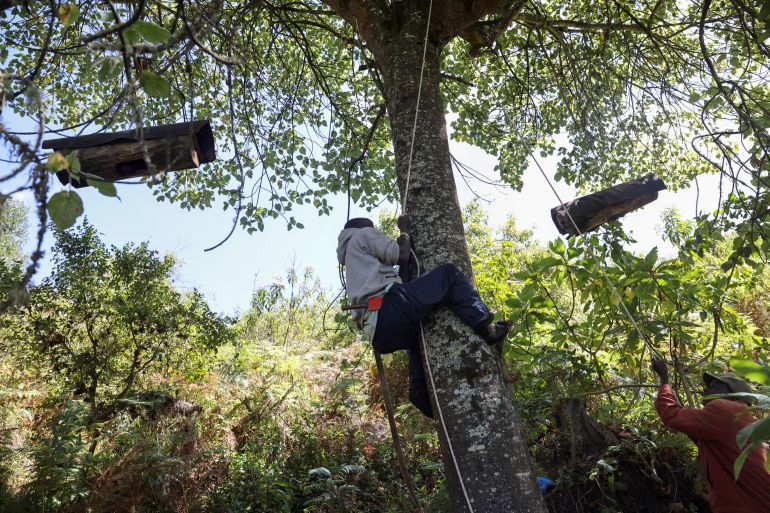Tackling poverty can start with embracing the GDP of the poor
Governments in Africa and beyond will not be able to handle the cost-of-living crisis unless they start paying attention to the resource that feeds the poor: nature.

Over the past three years, a cost-of-living crisis has spread across the world, affecting both rich and poor countries. Many are blaming it on the economic shocks of the COVID-19 pandemic and Russia’s invasion of Ukraine. In Africa, these events have had an impact, but the growing impoverishment was already apparent even before they occurred.
Across the continent, the cost-of-living crisis has hit hard communities that were already struggling to access enough food, fuel, decent work and social support to survive. The already poor have been getting poorer; those living just above the poverty line have been sinking below it. Since the pandemic, 55 million more Africans have fallen into extreme poverty.
Much of this impoverishment is driven by the long-term decline in the natural resources that sustain poor households. The degradation of soils, freshwater, forests and biodiversity is directly affecting the livelihoods of millions of poor people living in rural areas. This is because these resources provide food, fuel, building materials and employment to these communities.
According to the United Nations Food and Agriculture Organization, some 90 percent of people who live in extreme poverty depend on forests for at least part of their livelihoods. And in recent years, deforestation – as well as other types of environmental degradation – has only accelerated. This trend did not change even during the pandemic.
Yet, the primary response from governments in Africa has been a continued emphasis on conventional economic growth. The problem with this approach is that it fixates on gross domestic product (GDP) as the sole barometer of economic progress, which does not take into account the wealth contained in nature and ecosystems.
This myopic focus encourages policies and investments that disproportionately favour the wealthy while leaving behind the poor and allowing the abuse and depletion of natural resources they depend on.
Instead, what African policymakers should focus on the natural environment which sustains the poor and without which they cannot survive the rising cost of living – or any future crises for that matter.
Governments need to take action to curb environmental degradation which is rendering natural resources scarcer and less resilient. And to do that, they need to change the way they measure progress and growth. They need to embrace the GDP of the poor: nature.
They need to put it at the centre of their policymaking when it comes to big business, including agriculture, industry and finance. The revenue these businesses generate for public budgets cannot outweigh the negative effects they have on the environment and the economic losses they cause.
What is more, taking action to preserve the environment often costs less than supporting large polluting businesses to ensure they are profitable.
Take agriculture as an example. The way subsidies are currently disbursed favours industrialised, chemical-dependent farming, benefitting primarily large landowners and multinational corporations at the expense of smallholder farmers and the environment.
A staggering $611bn is spent annually on farming subsidies, 86 percent ($528bn) of which potentially harms the climate, biodiversity, and human health. This sum eclipses the estimated $300-350bn required each year to transition to sustainable, diverse, and climate-resilient food systems.
It is high time governments, multilateral organisations, and corporations transform the rhetoric of “leave no one behind” into reality by recognising and protecting the GDP of the poor. It is time we realigned sustainable development with human development.
To do that, there are three key steps that need to be taken urgently. First, governments should transform their wealth accounting systems by measuring the GDP of the poor. Rwanda already started doing so in 2014, enabling more effective land use planning and preventing the fragmentation of ecosystems. Governments can also use as a model the Ecosystem Accounting framework, which was adopted by the United Nations Statistical Commission in 2021.
Second, governments and development partners must help African farmers transition from extractive, high-carbon farming to regenerative practices that boost the GDP of the poor. An example they can follow is Germany’s plan to end subsidies for harmful agricultural practices and promote research and development of alternative methods.
Third, development finance institutions and corporations must redirect their investment strategies to protect and sustain natural assets. They should prioritise projects and initiatives that empower local communities to manage and benefit from their environments.
To be sure, recognising the GDP of the poor is not merely an act of accounting; it is a necessary shift in our political economy. By acknowledging these assets, we can begin to loosen the grip of entrenched interests benefitting from the status quo, simultaneously improving the welfare of the majority and safeguarding Earth’s natural resources.
The cost-of-living crisis is a wake-up call to take a hard look at our priorities, our systems, and our values. A call to realise that in our pursuit of wealth, we have overlooked the wealth of nature that sustains billions of poor people.
What is at stake is more than just numbers on a balance sheet. What is at stake is our survival as a human race.
The views expressed in this article are the author’s own and do not necessarily reflect Al Jazeera’s editorial stance.
